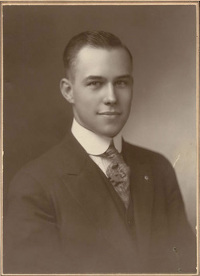
In the summer of 1920, as the states were considering whether to grant suffrage to women, Tennessee became a battleground. The 19th amendment would become law if 36 of the 48 states approved it, but only 35 had ratified the measure, and 8 had rejected it. Of the remaining states, only Tennessee was even close to holding the needed votes. When the state senate voted 25 to 4 in favor, suffrage leader Carrie Chapman Catt wrote, “We are one-half of one state away from victory.” The final decision would fall to the state house of representatives, where it appeared poised to fail by a single vote.
On the morning of the vote, the General Assembly’s youngest member, Republican Harry Burn, who had been counted as a certain opponent of the amendment, received a letter from his mother:
Dear Son:
Hurrah, and vote for suffrage! Don’t keep them in doubt. I noticed some of the speeches against. They were bitter. I have been watching to see how you stood, but have not noticed anything yet. Don’t forget to be a good boy and help Mrs. Catt put the ‘rat’ in ratification.
Your Mother
When his name was called, Burn said “aye” and the measure passed. The next day, he rose to explain his vote: “I want to take this opportunity to state that I changed my vote in favor of ratification because: 1) I believe in full suffrage as a right, 2) I believe we had a moral and legal right to ratify, 3) I know that a mother’s advice is always safest for her boy to follow, and my mother wanted me to vote for ratification.”
